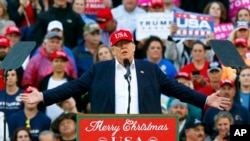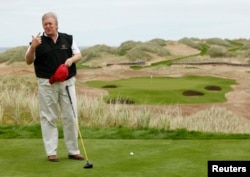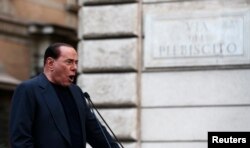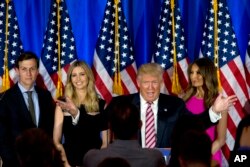Is President-elect Donald Trump's plan to turn over control of his company to his two sons enough to insulate him from conflicts of interest in the White House? How do other countries grappling with corruption among political elites perceive the brewing controversy dogging the incoming American president? What will be the fallout for the U.S.-supported global anti-corruption effort?
Trump has ruled out selling off his vast global business interests but has said he'll announce a plan next month to address his business conflicts.
To explore questions about the conflicts, VOA's Masood Farivar spoke with Stuart Gilman, a veteran of the Office of Government Ethics, the U.S. agency charged with policing conflicts of interest and corruption in government.
As an assistant director of OGE from 1989 to 2001, Gilman led the agency's international outreach program and worked with foreign governments to provide a framework for them to think about eliminating or preventing corruption. He is now a senior partner with the Global Integrity Group, an anti-corruption consultancy.
The following transcript of the interview was edited for clarity and length.
Q: Some past officials have divested assets to avoid conflicts — Hyatt Hotels heiress and current U.S.Commerce Secretary Penny Pritzker, for example. Can't Trump do that?
A: The law on conflict of interest applies to every government official except the president and the vice president. The only penalty for the president and vice president under the U.S. Constitution is impeachment. Having said that, every president since 1978 has placed his holdings in a blind trust (a financial arrangement under which an independent trustee manages a government official's business interests in order to avoid conflicts of interest) that is overseen by the U.S. Office of Government Ethics.
Mr. Trump has vast holdings, but the office has dealt with people with vast holdings. They have experience with that. For him, in terms of not dealing directly with a blind trust, I'd argue, it's much more a personal decision than something that can't be done. I'm sure politically it would be the argument if he decides not to do it, but it can be done.
Every business he's involved in, the U.S. government has some sort of decision-making power in terms of tax, in terms of insurance, in terms of protection, in terms of a host of other things. Whether or not he does any new deals at all is irrelevant. He'll be conflicted the moment he steps into the office.
Q: The Office of Government Ethics has recommended that the president-elect divest his assets and put them in a blind trust. What specific laws come into play if the president-elect doesn't accept the recommendation?
A: The sad thing is none. The only thing that could happen is that the Congress of the United States could take this up as an impeachment issue. But since his party controls both houses, that, in all likelihood, will not happen. I think what will happen is either a diminution of the Office of Government Ethics or the Republican Congress passing laws exempting Mr. Trump or people of that wealth from the ethics rules that were passed in 1978.
Q: If Trump doesn't divest, what sort of transparency is needed to police conflicts?
A: It would be almost impossible, given the range of activities a president makes in a day, from sending troops, transferring troops, making decisions about who in the Department of Agriculture or Bureau of Alcohol, Tobacco, Firearms and Explosives deals with wine. Trump owns a vineyard.
Some have suggested an ethics panel. The watchdog would have to be in the office 24 hours a day, seven days a week. Look, somebody walks into the Oval Office for a meeting. They're discussing exemptions for certain real estate dealings. Those real estate dealings would have a direct and predictable impact, which is the OGE standard, on Mr. Trump's wealth.
The dilemma is, the model Mr. Trump is following is the model of former Prime Minister Silvio Berlusconi of Italy, who went into office — and looked at advice from the office of government ethics initially — but by controlling both the private and public media in Italy, he made a fortune as prime minister. He was wealthy already and basically more than doubled his assets while prime minister because of the conflicts of interest that the Italian parliament chose to ignore.
Q: Help us understand how a total divestment would help the president escape the appearance of a conflict if his children remain in charge of the Trump businesses.
A: The question basically is, if his sons control this, is it truly a divestiture? And that's why a blind trust is emphasized.The OGE typically gives the person the choice of three trustees who have really good experience in this, and they can choose one of the three. Those people can hold on to those properties or they can sell them or they can exchange them, but the only thing the president gets is a tax statement at the end of the year so he can file his income tax.
His sons controlling this is not a blind trust. In fact, it's a complete "seeing" trust, because the idea that he'd have no contact with his children is simply absurd. That seems to be the model they're working toward.
Q: Trump wants his daughter, Ivanka, and son-in-law, Jared Kushner, to work in the White House. Is that a problem? How can it be resolved?
A: They actually play several roles. The anti-nepotism rules — that is, not having family members — should be in place. But the big issue is, are they still going to have interests in the companies? And if they're special government employees, then they're subject to the same ethics rules as anybody in the government, including the criminal statutes and the civil statutes. And I don't think they've thought through all of this.
Q: Mixing business with politics is not unusual in some parts of the world. How do foreign governments perceive the controversy over Trump's business conflicts?
A: Most of the emails I get from colleagues are humorous. They see this as hilarious because the U.S. has been preaching to the world the value of all of this (anti-corruption), and now they're confronted with their own negative reality.
Those countries that have really benefited in terms of international investment, internal development, that are partially the result of good anti-corruption regimes and effective preventive mechanisms will continue with the development.
The countries that have not done as well will simply use this as an excuse: "If the U.S. basically has all of this, why should we bother doing it?" That's the tragedy. The U.S. always wants to lead, and, in at least the ethics and anti-corruption area, we'll be slipping backward, and I don't think we'll be doing service to the global countries because this will no longer be an effective model.
The question is: Can you effectively advocate for this when your own government system seems to be backsliding? I hope it doesn't happen. I hope we continue to be a model for countries around the world in terms of dealing with the integrity, creating integrity, and fighting corruption.







